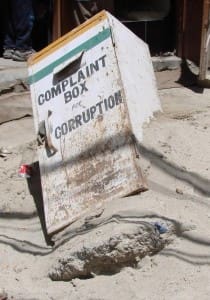I was looking through the “Anti Corruption Handbook for Development Practitioners” published by the Ministry for Foreign Affairs of Finland (2012). I won’t lie and say I read every page of the 220-page document, but I looked carefully to see what I might be able to learn.
Corruption is definitely a problem in both Palestine and Israel, at all levels. It has a tangible impact on nearly all aspects of life: money is wasted that could be put to good use, inequality between rich and poor grows, people become angry and disillusioned by the lack of fair opportunity, political and economic development are distorted, and so much more.

I’ve heard stories about blatant corruption, for example, when employees are paid the salary stated in their contract but are required to bring back half of it in cash every month in order to keep their jobs. Yes, that happens. I’ve also experienced a kind of corruption that is more complex, and in a way, more sinister.
For example, many international donors require that NGO grantees provide, or at least keep, receipts of expenditures paid for with grant funds. Fair enough. The receipts, however, must be official tax receipts, and depending on the amount of the expense, the NGO needs another document proving the vendor has a clean tax record. This is logical when you consider that aid money is needed because tax collections are low and that aid funds should be used in accordance with local law, which includes the payment of sales tax. However, not all vendors are able to provide tax receipts, and not all have proof of a clean tax record.
I know what you’re saying. You’re saying, “Good! Let the money flow to the honest and law-abiding people so the others will be pressured into complying with the law.”
It’s not always that easy.
I was once involved in giving a grant to an NGO in a Palestinian village. A major objective of the grant was to keep the funds inside the village in order to activate the local economy. However, none of the vendors in the village were able to provide tax receipts, so the NGO had to purchase the materials from a big company in Ramallah – just to get the paper required for the donor.
Another time, an NGO grantee found supplies they wanted from vendors who offered tax receipts and vendors who didn’t, but the vendors who offered tax receipts wanted 50% more for the materials. (They ended up buying from the vendor without a tax receipt and purchasing a tax receipt—a forged document—from someone else.
Is all this petty corruption the fault of the Palestinian NGOs? Or do international donors share some fault for requiring NGOs to provide documents that cannot realistically be provided in a legal way?
I know what you’re saying. You’re saying, “Why don’t they just open tax accounts and pay their taxes?”
That’s a good question.
Some people don’t want to pay taxes because they want to keep the money for themselves. That’s true. But even an entity that wants to pay taxes may find it difficult for a number of reasons. When I worked for a Palestinian NGO, it took years and great effort for us to open a tax file because the organization wasn’t registered, and it was the Palestinian Authority itself that was delaying the registration. In other words, “You have to pay, but we won’t let you pay.” Moreover, some organizations can never get legal status for political reasons or because of bureaucratic mess-ups. Still others don’t want to pay taxes to the Palestinian Authority because they don’t consider it legitimate, and because they aren’t accountable for the taxes they do collect. You see? It’s complicated.
But I’m more interested in corruption at a higher level.
Handbooks like Finland’s “Anti Corruption Handbook for Development Practitioners” (and I’ve seen many of them) do acknowledge the responsibility of international actors. For example, p. 43 of Finland’s Handbook states:
INTERNATIONAL/REGIONAL ANTI-CORRUPTION CONVENTIONS OBLIGATE BOTH THE EU MEMBER STATES AND PARTNER COUNTRIES. Support for governance is more than tackling corruption and it cannot be addressed in isolation. Corruption is a major obstacle to achieving development objectives and a symptom of poor governance. International and regional agreements on corruption, must be adhered to, ratified and duly implemented by all development partners.
But when you read further, they imply that the responsibility for addressing corruption is shared, buy that corruption is a problem solely in the receiving country. Corruption in developing contexts, they say, is a failure of governance, but overlook the possibility that there is a failure of governance on the part of international actors involved in development cooperation.
What I’m saying is that international aid and development agencies may themselves be corrupt and may be enforcing corruption on Palestine through their control of funds.
Read this, for example, from p. 21 of Finland’s Handbook:
STATE CAPTURE is recognised as a most destructive and intractable corruption problem. It is a phenomenon in which outside interests (private sector, mafia network etc.) are able to bend state laws, policies and regulation to their benefit through corrupt transactions with public officers and politicians.
Don’t “outside interests” include the political interests of foreign countries?
Are you following my train of thought? What do you think?
Bravo to Maria Khoury for putting on Oktoberfest in Taybeh. She is a remarkable and committed woman.
As for corruption, it is much more complicated in Palestine as you note, but it tends to be worse when there is no state or institutionalized procedures respected by the populace as fair.